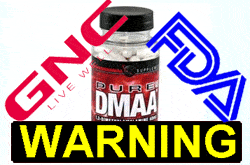
GNC Holdings Inc., the operator of popular GNC health and wellness stores, is disputing a recent U.S. Food & Drug Administration’s (FDA) warning questioning the safety of DMAA dietary supplements. In a statement issued yesterday, GNC asserted that agency has not cited medical or scientific evidence showing that DMAA is unsafe. The company maintains that, […]
 GNC Holdings Inc., the operator of popular GNC health and wellness stores, is disputing a recent U.S. Food & Drug Administration’s (FDA) warning questioning the safety of DMAA dietary supplements. In a statement issued yesterday, GNC asserted that agency has not cited medical or scientific evidence showing that DMAA is unsafe. The company maintains that, when used as directed, DMAA supplements have “the same effect on the body as drinking two cups of coffee.”
GNC Holdings Inc., the operator of popular GNC health and wellness stores, is disputing a recent U.S. Food & Drug Administration’s (FDA) warning questioning the safety of DMAA dietary supplements. In a statement issued yesterday, GNC asserted that agency has not cited medical or scientific evidence showing that DMAA is unsafe. The company maintains that, when used as directed, DMAA supplements have “the same effect on the body as drinking two cups of coffee.”
DMAA, also known as dimethylamylamine, was originally developed as a nasal decongestant, but is now used an ingredient in “workout boosters” sold under brand names like Lean Efx, Napalm, Nitric Blast and Jack3D. In December, the Department of Defense banned sales of DMAA supplements at military base commissaries after the deaths of two soldiers were tied to such products.
Last Friday, the FDA issued warning letters to 10 manufacturers and distributers of DMAA products, alleging sale of the chemical is illegal.
“Before marketing products containing DMAA, manufacturers and distributors have a responsibility under the law to provide evidence of the safety of their products. They haven’t done that and that makes the products adulterated,” Daniel Fabricant, director of the FDA’s Dietary Supplement Program, said in an agency statement.
According to the FDA, DMAA can narrow the blood vessels and arteries, which can elevate blood pressure and may lead to cardiovascular events ranging from shortness of breath and tightening in the chest, to heart attack, according to the agency. The FDA said it had received had received 42 adverse reports on products containing DMAA, including psychiatric disorders and death.
According to a report from the Pittsburgh Post-Gazette, GNC was not one of the companies that received an FDA warning, however, it does sell DMAA supplements at its retail stores and online. On Monday, GNC’s stock fell on news of the FDA warning.
In February, GNC was one of several companies named in a California class action lawsuit that accused it and other defendants of making misleading claims regarding Cellucor’s C-4 Extreme supplement, which contains DMAA. The lawsuit alleges GNC and other defendants failed to disclose that DMAA is wholly synthetic, manufactured and not derived from the geranium plant.
According to a report from CNBC, at least seven studies have failed to show that DMAA is derived from geranium oil. In January, the American Herbal Products Association (AHPA), the only national trade association that is focused on herbs and herbal products, informed its members that DMAA should not be labeled as a product of geranium oil.
The FDA warning letters have already prompted one major retailer, Amazon, to stop carrying the DMAA products.


